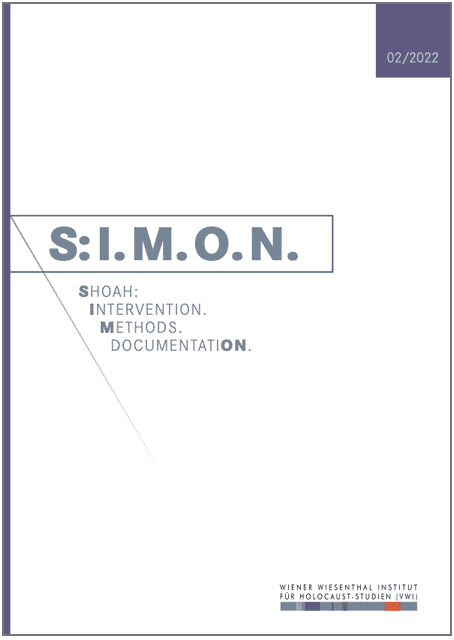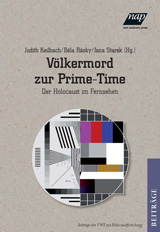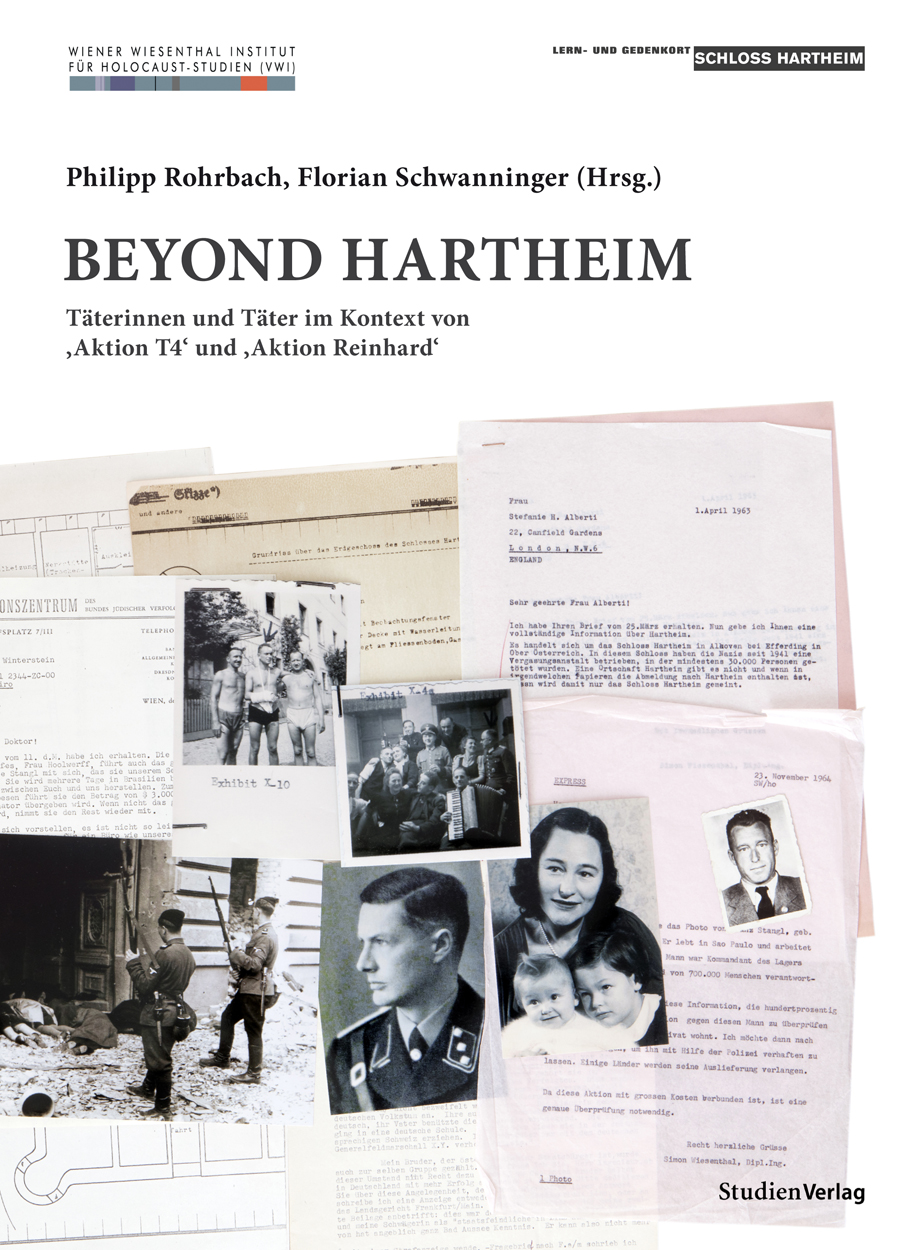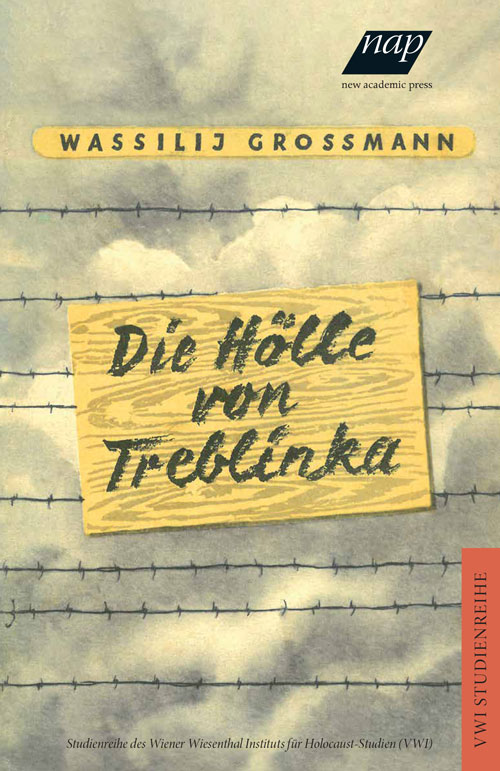News – Events – Calls
| 24. April 2024 19:00 BuchpräsentationIngeborg Bachmann, Marie Luise Kaschnitz, Hilde Domin, Nelly Sachs: Über Grenzen sprechend. Briefe. Piper/Suhrkamp, München, Berlin, Zürich 2023Ingeborg Bachmann stand mit zentralen Protagonistinnen der deutschsprachigen Literatur im Austausch, nun werden ihre Briefwechsel mit Marie Luise Kaschnitz, Hilde Domin und Nelly Sachs erstmals zugänglich gemacht. Die Briefe geben Einblick in die Lebensbedingungen, das literarische S...Weiterlesen... |
| 02. May 2024 18:30 Simon Wiesenthal LectureEdyta Gawron: Never Too Late to Remember, Never Too Late for Justice! Holocaust Research and Commemoration in Contemporary PolandIn 1994, Simon Wiesenthal received a doctorate honoris causa from the Jagiellonian University in Krakow for his lifelong quest for justice – half a century after he had been, for a short time, prisoner of the local Nazi Concentration Camp (KL) Plaszow. The 1990s were the decade when t...Weiterlesen... |
| 07. May 2024 00:00 - 04. June 2024 00:00 WorkshopDealing with Antisemitism in the Past and Present. Scientific Organisations and the State of Research in AustriaThis series of talks, presented by antisemitism experts from different organisations that research antisemitism using a variety of academic approaches, aims to provide a snapshot of historical evolutions, current events, prevalent perceptions and declared (and undeclared) attitudes. I...Weiterlesen... |
| 14. May 2024 08:45 - 16. May 2024 16:30 TagungQuantifying the Holocaust. Classifying, Counting, Modeling: What Contribution to Holocaust History? About the conference: https://quantiholocaust.sciencesconf.org/ Programme timed on the basis of 15-minute presentations + 15-minute discussions; short breaks and lunches Day 1 Tuesday, 14 May 2024Centre Malher (9 rue Malher 75004 Paris/amphi Dupuis) From 8.45 am: Welcome9.30 am...Weiterlesen... |
| 24. May 2024 18:00 InterventionLange Nacht der Forschung 20242024 öffnet das Wiener Wiesenthal Institut für Holocaust-Studien (VWI) in der Langen Nacht der Forschung wieder seine Tore und lädt Interessierte in seine Räumlichkeiten am Rabensteig 3 ein. Im Rahmen von Vorträgen, Podiumsdiskussionen und Präsentationen bieten VWI-Team und Gäste Einb...Weiterlesen... |
Alexandra Birch
Research Fellow (10/2023 – 08/2024)
GULAGSound: Music and Mizrahim in Tashkent
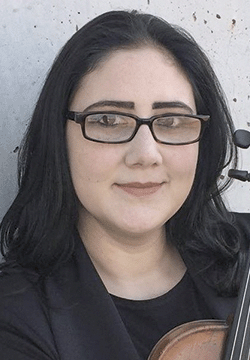 The detention of artists and musicians was a central feature of the cultural devastation of Soviet terror. Contemporaneous with the Holocaust, Stalinisation, terror and the gulag system unleashed the targeted destruction of Jewish communities from Ukraine to Vladivostok. To expand the existing Holocaust historiography, this project examines two sonic spaces of internment: first, as part of a study of evacuees during World War II and their interactions with sound during transport; second, as part of a local study of Tashkent that looks at Jewish transit to Birobidzhan in the pre-war period and the interactions of evacuated Jews with Bukharian Jewish communities in Central Asia.
The detention of artists and musicians was a central feature of the cultural devastation of Soviet terror. Contemporaneous with the Holocaust, Stalinisation, terror and the gulag system unleashed the targeted destruction of Jewish communities from Ukraine to Vladivostok. To expand the existing Holocaust historiography, this project examines two sonic spaces of internment: first, as part of a study of evacuees during World War II and their interactions with sound during transport; second, as part of a local study of Tashkent that looks at Jewish transit to Birobidzhan in the pre-war period and the interactions of evacuated Jews with Bukharian Jewish communities in Central Asia.
Alexandra Birch, internationally acclaimed violinist and historian. Studied music (PhD) at Arizona State University, performed in over twenty countries. Currently studying history (PhD) at UC Santa Barbara on the connection between music and mass crimes in the former USSR.
E-Mail: This email address is being protected from spambots. You need JavaScript enabled to view it.
Jenny Watson
Research Fellow (04/2024 – 08/2024)
Articulating Atrocity: Metaphors of Rural Life in Accounts of Mass Shooting
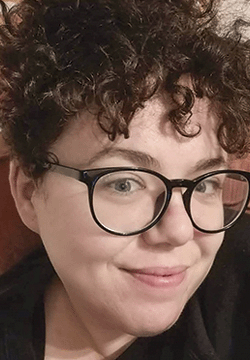 Building on existing works on agricultural metaphors in the context of mass killing, the project expands the focus by including historical sources. It analyses first-hand accounts of mass shootings to explore the ways in which perpetrators, survivors and witnesses used language from everyday life to articulate the atrocities they had committed, experienced or witnessed. The hypothesis - developed from work with literary texts and inspired by Alon Confinos' work on "unconscious narrative enactment" - is that individuals view the motives and processes of mass murder through the lens of the norms of communal processes such as hunting, harvesting and slaughter.
Building on existing works on agricultural metaphors in the context of mass killing, the project expands the focus by including historical sources. It analyses first-hand accounts of mass shootings to explore the ways in which perpetrators, survivors and witnesses used language from everyday life to articulate the atrocities they had committed, experienced or witnessed. The hypothesis - developed from work with literary texts and inspired by Alon Confinos' work on "unconscious narrative enactment" - is that individuals view the motives and processes of mass murder through the lens of the norms of communal processes such as hunting, harvesting and slaughter.
Jenny Watson, Chancellor's Fellow at the University of Edinburgh, where she teaches in the German programme of the School of Languages, Literatures and Cultures. Her postdoctoral project, “Restless Earth: Extra-Concentrationary Violence since 1945”, focused on the representation of the so-called "Holocaust by Bullets" in post-war German-language literature.
E-Mail: This email address is being protected from spambots. You need JavaScript enabled to view it.
Research Fellowships 2023/24 at The Vienna Wiesenthal Institute for Holocaust Studies (VWI)
The Vienna Wiesenthal Institute for Holocaust Studies (VWI) invites applications for its research fellowships for the academic year 2023/24.
The VWI is an academic institution dedicated to the research and documentation of antisemitism, racism, nationalism and the Holocaust. Conceived and established during Simon Wiesenthal’s lifetime, the VWI receives funding from the Austrian Federal Ministry of Education, Science and Research, the Federal Chancellery as well as the City of Vienna. Research at the Institute focuses on the Holocaust in its European context, including its antecedents and its aftermath.
Scholars who have completed their PhD studies and have produced works of scholarship are eligible for receiving a research fellowship. Research fellows will be able to conduct research on a topic of their choice in the field of Holocaust studies at the Institute. Beyond the research work itself, the stay at the Institute is intended to encourage communication and scientific exchange among the fellows at the institute. Research fellows are expected to support the Institute’s academic work and provide research adjective and support to junior fellows. Research fellows must be regularly present at the VWI.
Research projects are to focus on a topic relevant to the research interests of the VWI. Within this parameter, applicants are free to choose their own topic, approach, and methodology. Fellows will have access to the archives of the Institute. It is expected that fellows will make use of relevant resources from the collection in their research projects. Research results will be the subject of formal fellow’s discussion and will be presented to the wider public at regular intervals. At the end of their stay, fellows are required to submit a research paper which will be peer-reviewed and published in VWI’s e-journal S:I.M.O.N. – Shoah: Intervention. Methods. Documentation.
Research fellowships are awarded for a duration of between five and eleven months. They will have a working space and Internet access and will receive a monthly stipend of € 2,200. In addition, VWI will cover housing costs during the fellowship (up to € 700 per month) as well as the costs of a round-trip to and from Vienna (coach class airfare or 2nd class train fare). There is an additional one-off payment of € 500 available for research conducted outside of Vienna or pho-tocopying costs outside of the Institute, where applicable.
Research fellows will be selected by the International Academic Advisory Board of the VWI.
Applications may be submitted in English or German and must include the following documents:
- completed application form,
- a detailed description of the research project, including the research objectives, an overview of existing research on the topic and methodology (12,000-character max.)
- a list of publications and a CV with a photo, if not already included in application form (optional).
Please send your application in electronic format (in one integral *.pdf-file) with the subject header “VWI Research Fellowships 2023/24” by 13 January 2023 to: This email address is being protected from spambots. You need JavaScript enabled to view it..
If you do not get confirmation that we have received your proposal, please contact us.
Research Fellowships 2024/25 at The Vienna Wiesenthal Institute for Holocaust Studies (VWI)
The Vienna Wiesenthal Institute for Holocaust Studies (VWI) invites applications for its research fellowships for the academic year 2024/25.
The VWI is an academic institution dedicated to the research and documentation of antisemitism, racism, nationalism and the Holocaust. Conceived and established during Simon Wiesenthal’s lifetime, the VWI receives funding from the Austrian Federal Ministry of Education, Science and Research, the Federal Chancellery as well as the City of Vienna. Research at the Institute focus-es on the Holocaust in its European context, including its antecedents and its aftermath.
Scholars who have completed their PhD studies and have produced works of scholarship are eligible for receiving a research fellowship. Research fellows will be able to conduct research on a topic of their choice in the field of Holocaust studies at the Institute. Beyond the research work itself, the stay at the Institute is intended to encourage communication and scientific exchange among the fellows at the institute. Research fellows are expected to support the Institute’s aca-demic work and provide research adjective and support to junior fellows. Research fellows must be regularly present at the VWI.
Research projects of the research fellows are to focus on a topic relevant to the research inter-ests of the VWI. Within this parameter, applicants are free to choose their own topic, approach, and methodology. Fellows will have access to the archives of the Institute. It is expected that fellows will make use of relevant resources from the collection in their research projects. Research results will be the subject of formal fellow’s discussion and will be presented to the wider public at regular intervals. At the end of their stay, fellows are required to submit a research paper which will be peer-reviewed and published in VWI’s e-journal S:I.M.O.N. – Shoah: Intervention. Meth-ods. Documentation.
Research fellowships are awarded for a duration of between five and eleven months. They will have a working space and Internet access and will receive a monthly stipend of € 2,200.-. In ad-dition, VWI will cover housing costs during the fellowship (up to € 600.- per month) as well as the costs of a round-trip to and from Vienna (coach class airfare or 2nd class train fare). There is an additional one-off payment of € 200.- available for research conducted outside of Vienna or pho-tocopying costs outside of the Institute, where applicable.
Research fellows will be selected by the International Academic Advisory Board of the VWI.
Applications may be submitted in English or German and must include the following documents:
- completed application form,
- a detailed description of the research project, including the research objectives, an overview of existing research on the topic and methodology (12,000-character max.)
- a list of publications and a CV with a photo, if not already included in application form (optional).
Please send your application in electronic format (in one integral *.pdf-file) with the subject head-er “VWI Research Fellowships 2024/25” by 12 January 2024 to: This email address is being protected from spambots. You need JavaScript enabled to view it..
If you do not get confirmation that we have received your proposal, please contact us.
Gergely Kunt
Research Fellow (10/2022 – 03/2023)
"Images Of The Others": A Comparative Analysis of Anti-Romani and Anti-Semitic Narratives in Private and Public Discourse in Hungary from World War I to World War II
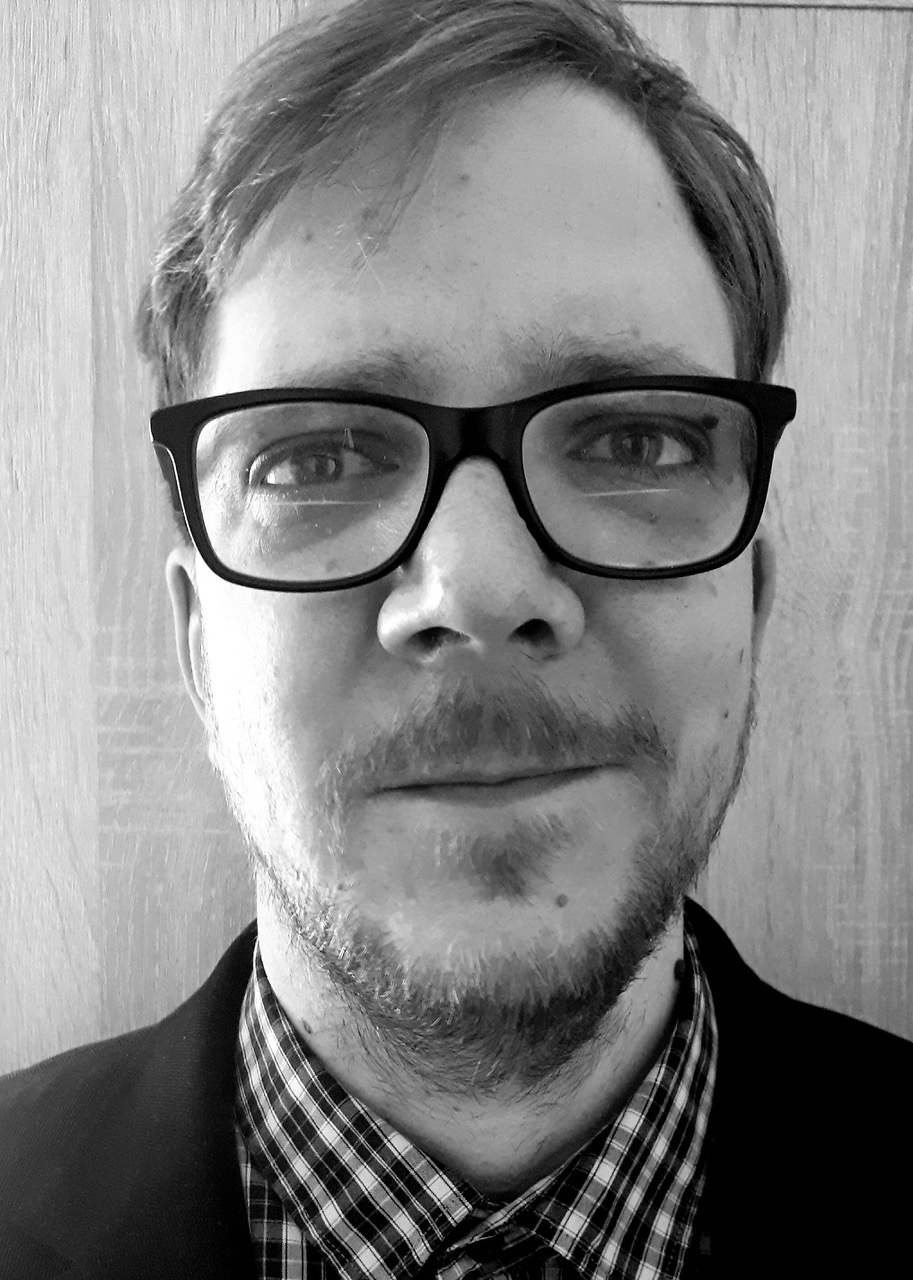 The project focuses on examining different levels of discourse that led to the association of negative social images and stereotypes of Jewish and Romani people in Hungary. Instead of focusing on the political background of the genocide or the anti-Roma and anti-Semitic laws, the "social and mental context" will be explored here - i.e. the dissemination of anti-Roma and anti-Semitic images and the internalisation of negative stereotypes by the majority group. Such images were an important prerequisite for the genocide during World War II. An interdisciplinary approach is taken: The research is primarily based on social psychology and the linguistic and discourse analysis of newspaper articles and first-person documents (especially diaries) from interwar Hungary, with special attention paid to the authors' use of language. The project treats the texts as part of the contemporary social reality created by language.
The project focuses on examining different levels of discourse that led to the association of negative social images and stereotypes of Jewish and Romani people in Hungary. Instead of focusing on the political background of the genocide or the anti-Roma and anti-Semitic laws, the "social and mental context" will be explored here - i.e. the dissemination of anti-Roma and anti-Semitic images and the internalisation of negative stereotypes by the majority group. Such images were an important prerequisite for the genocide during World War II. An interdisciplinary approach is taken: The research is primarily based on social psychology and the linguistic and discourse analysis of newspaper articles and first-person documents (especially diaries) from interwar Hungary, with special attention paid to the authors' use of language. The project treats the texts as part of the contemporary social reality created by language.
Gergely Kunt, social historian and Assistant Professor at the University of Miskolc (Hungary). Founding member of the European Ego-Documents Archive and Collections Network (EDAC). Author of The Children's Republic of Gaudiopolis: The History and Memory of a Children's Home for Holocaust and War Orphans (2022) and several monographs in Hungarian.He was Core Fellow at Institute for Advanced Study at Central European University; Weickert Postdoctoral Fellow at Fritz Bauer Institut at the University of Frankfurt am Main.
E-Mail: This email address is being protected from spambots. You need JavaScript enabled to view it.
Anna G. Piotrowska
Research Fellow (01/2023 – 06/2023)
Romani Musicians and the Holocaust
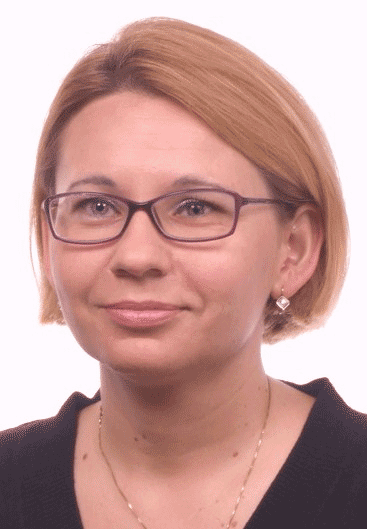 The project aims to shed light on the forgotten Holocaust of the Roma by examining the function of music and the position of Roma musicians in the concentration camps. While the starting point of the project is the analysis of the mechanisms of stereotyping the European "others" as musicians, the project predominantly reconstructs the position and reception of Roma musicians during the Holocaust, with a special focus on their situation in the concentration camps. The project focuses on Romani, but also on Jewish musicians who are particularly well-known in Central Europe, such as violinists and cimbalists, and examines their different musical traditions in the public sphere. The question is asked whether and to what extent their reception in European culture influenced the fate of Roma and Jewish musicians in the concentration camps.
The project aims to shed light on the forgotten Holocaust of the Roma by examining the function of music and the position of Roma musicians in the concentration camps. While the starting point of the project is the analysis of the mechanisms of stereotyping the European "others" as musicians, the project predominantly reconstructs the position and reception of Roma musicians during the Holocaust, with a special focus on their situation in the concentration camps. The project focuses on Romani, but also on Jewish musicians who are particularly well-known in Central Europe, such as violinists and cimbalists, and examines their different musical traditions in the public sphere. The question is asked whether and to what extent their reception in European culture influenced the fate of Roma and Jewish musicians in the concentration camps.
Anna G. Piotrowska, musicologist (Jagiellonian University in Krakow and Durham University), has published numerous books and articles on the role music plays in shaping, influencing and reflecting cultural and political contexts. She is concerned with issues at the intersection of music culture and the concepts of race and ethnicity.
E-Mail: This email address is being protected from spambots. You need JavaScript enabled to view it.
Maximilian Becker
Research Fellow (10/2014 - 08/2015)
Survivors and Resisters. European Networks of Survivors and Former Resistance Fighters
 Immediately following the liberation in 1945, victims of persecution by the National Socialists began to establish associations in order to represent their interests, maintain the public memory of the war and the persecution and achieve punishment for those responsible for the crimes. Those associations established transnational umbrella organizations such as the international concentration camp committees that unite former inmates of the large camps and the „International Federation of Resistance Fighters“ (FIR). These organizations united under their auspices associations on either side of the "Iron Curtain". This project aims to analyze the transnational operations that such associations of persecuted persons engaged in at hand of the example of FIR. The activities regarded the politics of memory, reparations and social care for formerly persecuted persons as well as the prosecution of Nazi criminals and collaborators.
Immediately following the liberation in 1945, victims of persecution by the National Socialists began to establish associations in order to represent their interests, maintain the public memory of the war and the persecution and achieve punishment for those responsible for the crimes. Those associations established transnational umbrella organizations such as the international concentration camp committees that unite former inmates of the large camps and the „International Federation of Resistance Fighters“ (FIR). These organizations united under their auspices associations on either side of the "Iron Curtain". This project aims to analyze the transnational operations that such associations of persecuted persons engaged in at hand of the example of FIR. The activities regarded the politics of memory, reparations and social care for formerly persecuted persons as well as the prosecution of Nazi criminals and collaborators.
Maximilian Becker studied modern and contemporary history as well as the history of East and South-East Europe and international law in Munich. PhD on the German judiciary in annexed Eastern territories in 1939-1945.
Rita Horváth
Research Fellow (10/2017–05/2018)
Negotiating Anger and Memory. Experiences of Hungarian Jewish Child Forced Labourers in Vienna and its Vicinity in 1944–1945 in Literary Memoirs and Testimonies
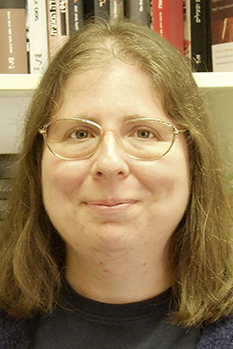 The experiences of Hungarian Jewish child forced labourers in Vienna and its vicinity in 1944/1945 as related in their testimonies and literary memoirs are the focus of this project. One of the special characteristics of this chapter of the Holocaust is that the majority of the witness accounts were given by former deportees who had been children at the time. Therefore, children’s memories have an especially prominent role in informing us about Viennese forced labour. This project explores the significance of this phenomenon and demonstrates what a wealth of crucial information we can learn from these child survivors.
The experiences of Hungarian Jewish child forced labourers in Vienna and its vicinity in 1944/1945 as related in their testimonies and literary memoirs are the focus of this project. One of the special characteristics of this chapter of the Holocaust is that the majority of the witness accounts were given by former deportees who had been children at the time. Therefore, children’s memories have an especially prominent role in informing us about Viennese forced labour. This project explores the significance of this phenomenon and demonstrates what a wealth of crucial information we can learn from these child survivors.
I shall focus on literary and historical research methods to explore these texts, finally comparing them with other child-survivor testimonies that were given to large-scale testimony-collecting projects. I aim to identify the central topics and their roles within the entire story, as well as the major emotions informing the memoirs and testimonies of child survivors of Viennese forced labour.
Rita Horváth is a literary scholar and historian. She received her Ph.D. from Bar-Ilan University in Ramat Gan in 2003. Since 2010, she has been a Research Associate at the Hadassah-Brandeis Institute, Brandeis University and a research fellow at the International Institute for Holocaust Research in Yad Vashem. From 2004, she taught in the Holocaust Studies Programme at Eötvös Loránd University in Budapest and between 2005 and 2012 she taught English literature courses and Holocaust literature courses at Bar-Ilan University. Her fields of research are the history of the Holocaust in Hungary, Holocaust literature, trauma, and literary theory.
Devrim Sezer
Research Fellow (02/2019–07/2019)
In the Shadow of Past Injustices. Guilt, Responsibility, and the Politics of Memory
 This project aims to explore the themes of genocide and collective responsibility in the works of Karl Jaspers, Hannah Arendt, and Raphael Lemkin in a Turkish context. It is based on the premise that Turkey has not come to terms with the Armenian genocide, and that our understanding of this failure can be sharpened by examining these thinkers’ reflections on the Holocaust. The project has two main pillars. First, I will explore the implications of Arendt’s emphasis on the unprecedented nature of the Holocaust for the Armenian genocide and critically evaluate her view of genocide in the light of Lemkin’s original conception. Second, I will focus on Jaspers’ and Arendt’s analyses of guilt/responsibility with particular reference to four groups: perpetrators, bystanders, successor generations, and victims and their descendants. This comparative analysis might help us develop a more robust conception of collective responsibility with particular emphasis on an acknowledgement of past injustices. In addition, the insights gleaned from that discussion can stimulate further scholarly/public debate on the memory of the Armenian genocide.
This project aims to explore the themes of genocide and collective responsibility in the works of Karl Jaspers, Hannah Arendt, and Raphael Lemkin in a Turkish context. It is based on the premise that Turkey has not come to terms with the Armenian genocide, and that our understanding of this failure can be sharpened by examining these thinkers’ reflections on the Holocaust. The project has two main pillars. First, I will explore the implications of Arendt’s emphasis on the unprecedented nature of the Holocaust for the Armenian genocide and critically evaluate her view of genocide in the light of Lemkin’s original conception. Second, I will focus on Jaspers’ and Arendt’s analyses of guilt/responsibility with particular reference to four groups: perpetrators, bystanders, successor generations, and victims and their descendants. This comparative analysis might help us develop a more robust conception of collective responsibility with particular emphasis on an acknowledgement of past injustices. In addition, the insights gleaned from that discussion can stimulate further scholarly/public debate on the memory of the Armenian genocide.
Devrim Sezer is Associate Professor of Political Thought at İzmir University of Economics. He received an MSc in Political Theory from the London School of Economics and a PhD in Political Science from Carleton University. His research interests include the history of political philosophy, theories of democracy/republicanism, literature and political thought, modernity and its critics, and contemporary debates on public memory and collective responsibility. He has published articles in History of Political Thought and History of European Ideas and contributed chapters to edited books.
Michal Frankl
Research Fellow (10/2018–03/2019)
Citizens of No Man’s Land. Jewish Refugees and Erosion of Citizenship in East-Central Europe, 1935–1939
 Throughout 1938, a new territory rapidly formed along the borders of East-Central European states: a No Man’s Land for refugees. Smaller or larger groups of people were forced to camp alongside roads, on fields, in dilapidated buildings, between border posts, or in internment behind the lines. Starting with the exploration of this No Man’s Land, this project examines the development of restrictive refugee policies in East-Central Europe and analyses the shift towards ethnic citizenship in the second half of the 1930s. Specifically, it focuses on the prehistory, implementation, and consequences of four large-scale cases of expulsion of Jews that led to border closures and the adoption of harsher policies towards Jewish refugees in 1938 and the denaturalization of Jewish citizens. It seeks to provide a better understanding of the interplay between the marginalisation of Jewish non-citizens and refugees and the erosion of the citizenship status and rights of the remaining Jewish community.
Throughout 1938, a new territory rapidly formed along the borders of East-Central European states: a No Man’s Land for refugees. Smaller or larger groups of people were forced to camp alongside roads, on fields, in dilapidated buildings, between border posts, or in internment behind the lines. Starting with the exploration of this No Man’s Land, this project examines the development of restrictive refugee policies in East-Central Europe and analyses the shift towards ethnic citizenship in the second half of the 1930s. Specifically, it focuses on the prehistory, implementation, and consequences of four large-scale cases of expulsion of Jews that led to border closures and the adoption of harsher policies towards Jewish refugees in 1938 and the denaturalization of Jewish citizens. It seeks to provide a better understanding of the interplay between the marginalisation of Jewish non-citizens and refugees and the erosion of the citizenship status and rights of the remaining Jewish community.
Michal Frankl is a senior researcher at the Masaryk Institute and Archives of the Czech Academy of Sciences and is a work package leader in the European Holocaust Research Infrastructure. He has published widely on the history of antisemitism, refugee policies, and the Holocaust in the Bohemian lands and East-Central Europe.
Diana Dumitru
Research Fellow (02/2019–07/2019)
From Friends to Enemies? The Soviet State and Its Jewry in the Aftermath of the Holocaust
 The primary goal of this research is to explore how Soviet society faced the aftermath of the Holocaust: What was the interaction between the three dynamics of (i) Jewish/non-Jewish encounters, (ii) the strategy/tactics of the Soviet state in this context, and (iii) the various paths taken by Soviet Jews, non-Jews, and the state when grasping the implications of the Holocaust and charting a path forward for Soviet society?
The primary goal of this research is to explore how Soviet society faced the aftermath of the Holocaust: What was the interaction between the three dynamics of (i) Jewish/non-Jewish encounters, (ii) the strategy/tactics of the Soviet state in this context, and (iii) the various paths taken by Soviet Jews, non-Jews, and the state when grasping the implications of the Holocaust and charting a path forward for Soviet society?
Specifically, this project aims to understand the extent to which an antisemitic agenda was embraced by the Soviet state and its political elites during the late Stalinist era, and what the open and/or hidden channels were for conveying this agenda to the mid- and lower-level agents tasked with its implementation. In so doing, it seeks to grasp the implications for the broader policies towards other ‘nationalities’ within the Soviet Union.
Diana Dumitru is Associate Professor of History at Ion Creangă State University of Moldova. She has authored over thirty articles and two books. Her second book, The State, Antisemitism and the Collaboration in the Holocaust. The Borderlands of Romania and the Soviet Union, was published by Cambridge University Press in 2016. She is a member of the advisory board of the EU project European Holocaust Research Infrastructure.






